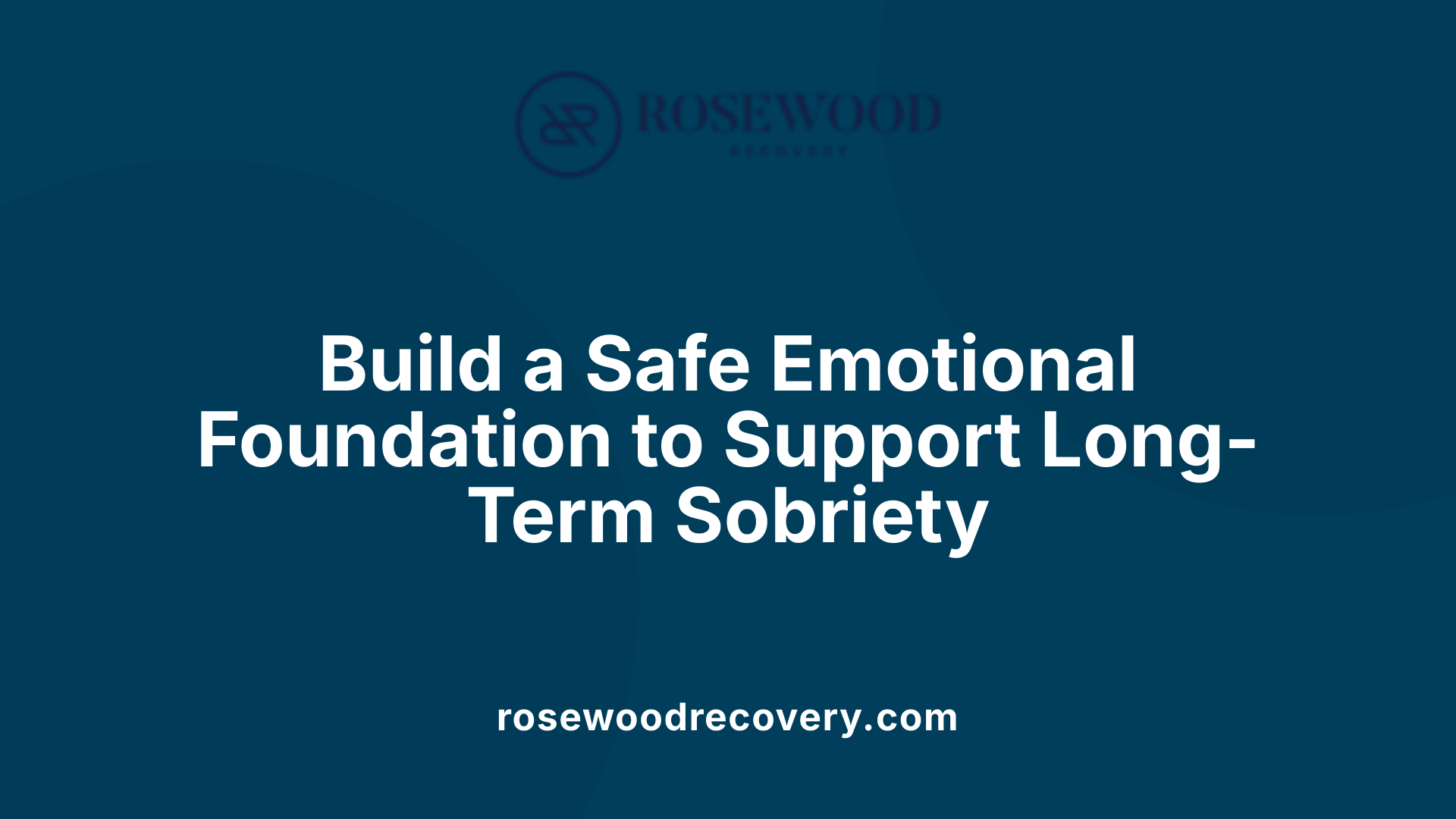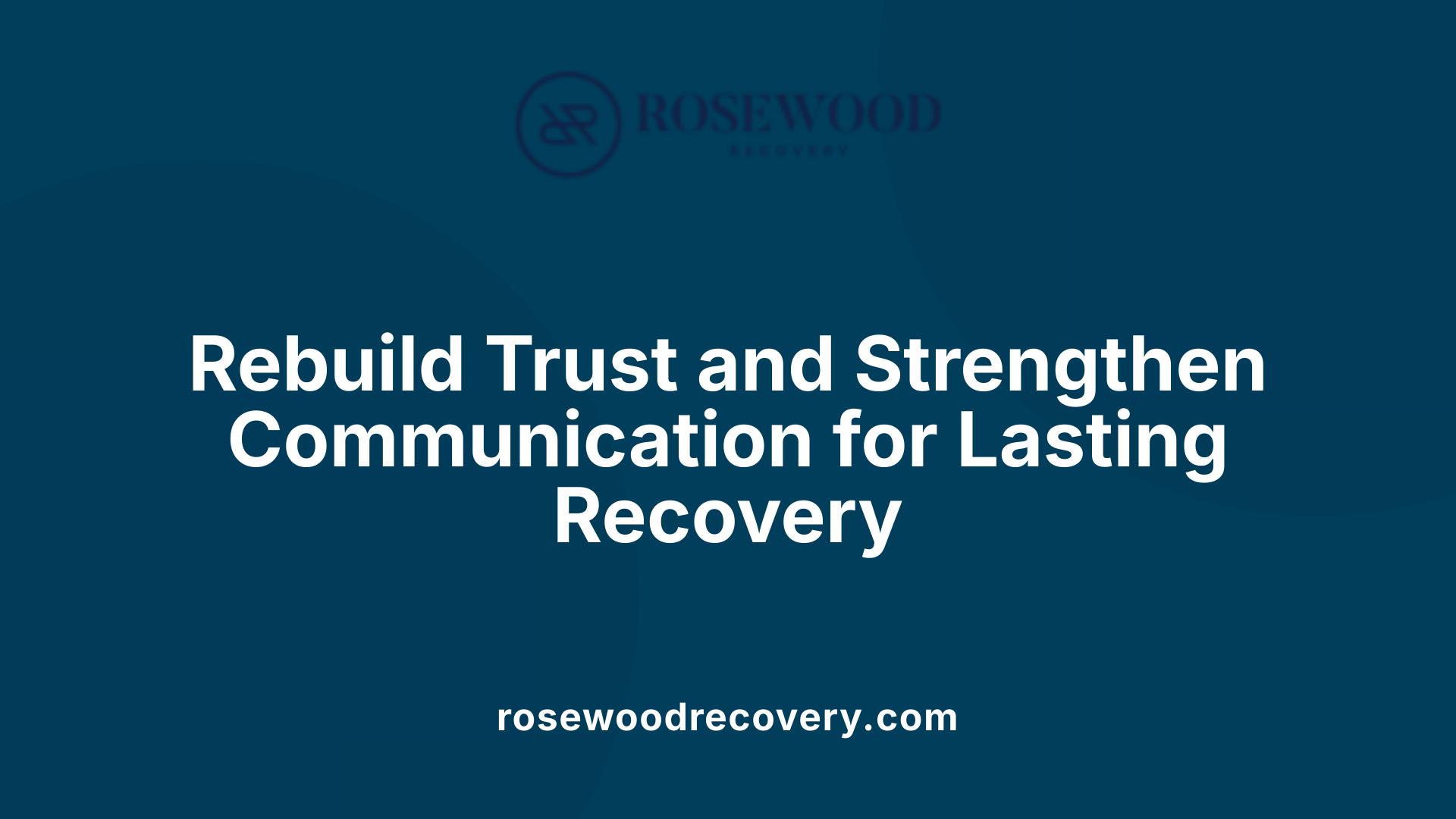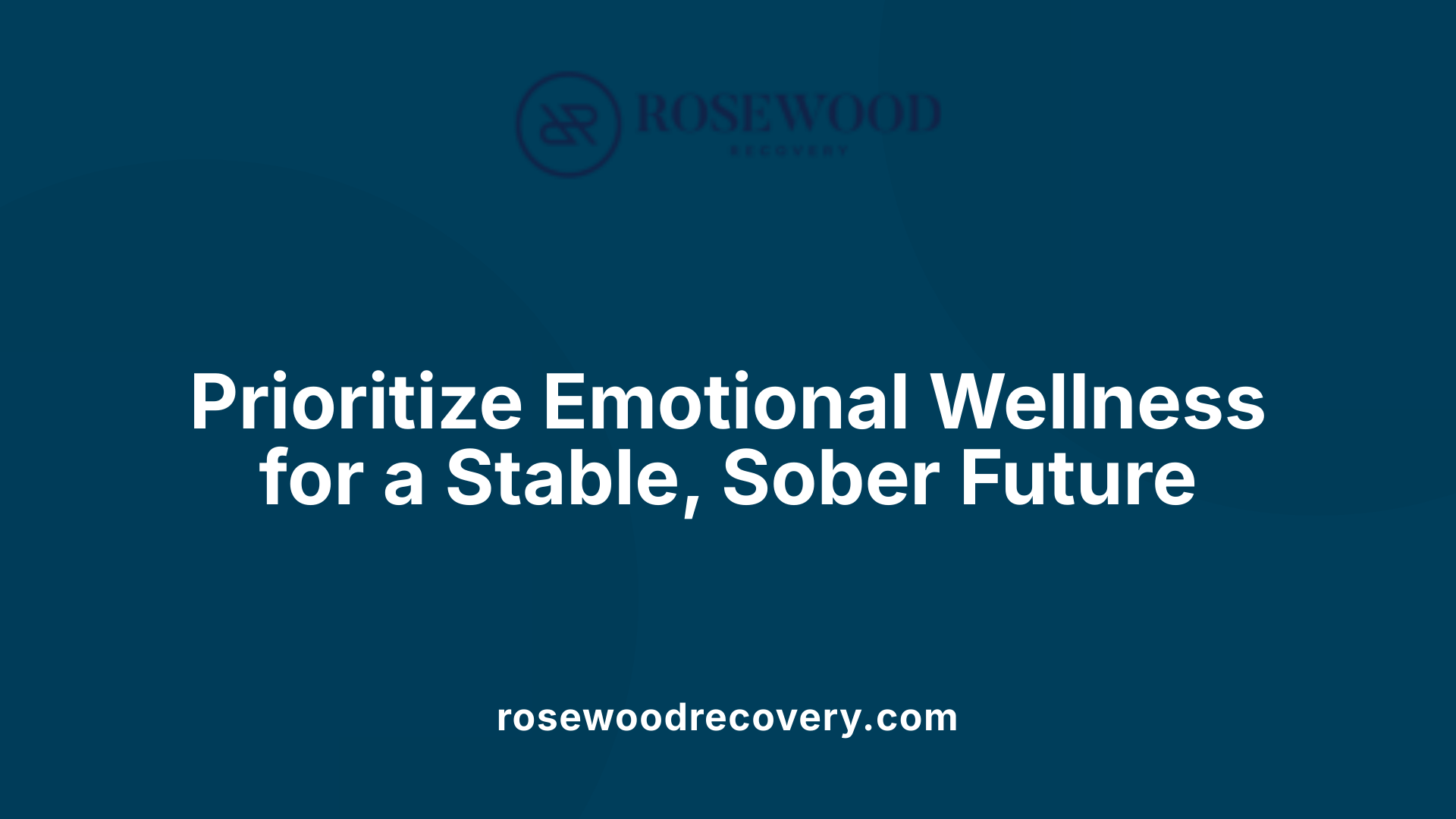Understanding the Significance of Emotional Repair
Addiction recovery extends beyond detoxification and physical sobriety. It involves a profound process of emotional healing and repair that addresses deep-seated trauma, rebuilds self-esteem, and fosters resilient emotional health. This article explores why emotional repair work is fundamental in addiction treatment, highlighting how emotional safety and connection enhance recovery outcomes, prevent relapse, and aid in rebuilding damaged relationships.
Creating a Foundation of Emotional Safety and Connection

Why is emotional connection and emotional safety important in addiction recovery?
Building emotional safety and connection is essential in the journey of addiction recovery. These elements foster a sense of trust, allowing individuals to feel respected, heard, and accepted. When people experience emotional safety, they become more open to sharing their struggles, past traumas, and vulnerabilities. This openness is crucial for healing emotional wounds that may drive substance use.
In an environment where emotional safety is prioritized, shame and feelings of isolation are significantly reduced. Since addiction often thrived in loneliness, creating genuine social bonds helps break this cycle. These bonds include supportive relationships with family, friends, therapy groups, and community organizations.
Trust plays a vital role. Rebuilding trust takes time and patience, but it underpins emotional vulnerability, an important strength in recovery. When individuals trust their support systems, they are more willing to face difficult emotions and confront past traumas, which are often connected to their addictive behaviors.
The effects of shame can be profound, preventing openness and reinforcing feelings of unworthiness. Removing shame through supportive connections encourages honesty and self-acceptance. This emotional safety creates a foundation that not only supports healing but also sustains motivation for long-term sobriety.
Overall, fostering emotional safety and connection promotes resilience, emotional regulation, and healthier relationships. These benefits extend beyond initial recovery, nurturing a stable, fulfilling life free from substance dependence.
The Impact of Emotional Isolation on Addiction and Its Healing

How prevalent is emotional isolation in addiction?
Emotional isolation is a common factor among individuals struggling with addiction. Many people turn to substances as a way to cope with feelings of loneliness, shame, or distrust that often accompany addiction. This sense of being emotionally disconnected can intensify feelings of shame and guilt, creating a cycle that makes it harder to seek help or build meaningful relationships.
Research indicates that emotional disconnection not only fuels substance use but also impairs brain function related to emotional regulation. Many individuals affected by addiction experience trauma, neglect, or abandonment, which contribute heavily to their sense of isolation. As a result, emotional wounds deepen, making recovery more complex.
How does isolation foster substance use?
Addiction tends to thrive in environments where emotional bonds are weak or absent. When someone feels alone or misunderstood, they may use alcohol or drugs to temporarily escape their emotional pain. Substance use serves as a form of self-medication, offering fleeting relief from feelings of emptiness or emotional turmoil.
Isolation also diminishes hope and motivation for change. Without support networks, individuals may believe they have no one to turn to, leading to secrecy and further withdrawal. This self-perpetuating cycle of loneliness and substance reliance makes breaking free particularly difficult.
What are the benefits of building social connections?
Developing genuine social connections is a vital step in addiction recovery. Connecting with others provides emotional safety—an environment where individuals feel respected, heard, and valued. These connections foster honesty, vulnerability, and trust, which are essential for emotional healing.
Support systems, including family, friends, peer groups, and community programs, help reduce shame and promote emotional safety. The culture of community, like at Renaissance Ranch, emphasizes shared experiences and faith-based values, creating a sense of brotherhood that bolsters resilience.
Building social ties offers numerous health benefits. It enhances emotional regulation, reduces relapse risk, and encourages healthier relationships. Feeling understood and accepted helps individuals confront past traumas and develop better coping skills. Overall, cultivating social connections transforms loneliness into community, which is crucial for sustaining long-term recovery.
Addressing Trauma and Healing Emotional Wounds

What is the link between trauma and addiction?
Many individuals battling addiction have a history of severe emotional trauma such as abuse, childhood neglect, or the loss of loved ones. These traumatic experiences often lead to negative emotional states like shame, guilt, and distrust, which can fuel substance use as a means of self-medication. Trauma can impair emotional regulation and foster feelings of isolation, making it harder to seek help or build genuine social connections.
Trauma affects brain chemistry and emotional functioning, creating a cycle where emotional pain feeds the desire to escape through substance use. This connection underscores the importance of addressing emotional wounds directly within recovery programs to facilitate true healing and prevent relapse.
Which trauma-focused therapies support addiction recovery?
Trauma-focused therapies play a crucial role in addiction treatment. Approaches like Cognitive Behavioral Therapy (CBT), Dialectical Behavior Therapy (DBT), and Eye Movement Desensitization and Reprocessing (EMDR) are widely used. These therapies help individuals confront painful memories safely, challenge distorted thoughts, and develop healthier coping mechanisms.
Supporting emotional healing involves creating a supportive environment where clients feel seen and accepted. Group therapy, family counseling, and peer support groups also provide shared experiences that foster connection and understanding.
Why is emotional healing important in recovery?
Healing emotional wounds is essential for lasting sobriety. When individuals work through trauma, they reduce feelings of shame and isolation that often hinder progress. Emotional recovery creates resilience, enabling individuals to manage stress, triggers, and negative emotions more effectively.
Moreover, emotional healing rebuilds trust—both within oneself and in relationships. It supports healthier self-esteem, enhances emotional regulation, and bolsters motivation to maintain change. Overall, addressing trauma and fostering emotional safety form the foundation for genuine recovery, helping people rebuild their lives and sustain long-term sobriety.
Developing Emotional Intelligence to Enhance Recovery
What are the components of emotional intelligence?
Emotional intelligence (EI) encompasses several interconnected skills that contribute to emotional growth and recovery. The primary components include self-awareness, which involves recognizing one’s own emotions; self-regulation, or managing and controlling emotional responses; motivation, driven by inner goals and resilience; empathy, understanding and sharing the feelings of others; and social skills, which enable effective communication and relationship-building.
These elements work together to strengthen an individual's ability to navigate emotional challenges, particularly in recovery from addiction. Building these skills helps reduce feelings of shame and isolation, fostering a sense of acceptance and resilience.
What methods are effective for emotional repair and developing emotional intelligence in recovery?
Effective strategies for emotional repair and EI development are diverse and complement therapeutic interventions. Key methods include:
- Therapeutic Modalities: Engaging in therapies like Cognitive Behavioral Therapy (CBT), Dialectical Behavior Therapy (DBT), and Emotion-Focused Therapy (EFT), which help individuals explore, understand, and regulate their emotions.
- Mindfulness Practices: Techniques such as meditation and mindfulness-based stress reduction promote present-moment awareness, reduce emotional reactivity, and improve emotional regulation.
- Expressive Techniques: Journaling, deep breathing exercises, grounding activities, and physical exercise assist in processing feelings, recognizing triggers, and maintaining emotional stability.
- Building Self-awareness and Empathy: Practices like active listening, reflection, and developing compassion help strengthen EI and foster better connections.
- Support Groups and Faith-Based Programs: Shared experiences and spiritual guidance provide additional avenues for emotional regulation, community support, and lasting recovery.
Implementing these methods encourages emotional healing, helps individuals develop resilience, and supports long-term sobriety.
What are the benefits of emotional intelligence in recovery?
Developing strong emotional intelligence offers numerous advantages during and after addiction treatment. These benefits include:
- Enhanced Emotional Regulation: Better management of mood swings, cravings, and stress, which reduces relapse risk.
- Improved Relationships: Honest communication and empathy enable repairing and strengthening personal connections.
- Increased Resilience: The capacity to recover from setbacks and face future challenges with confidence.
- Reduced Shame and Isolation: Feeling understood and accepted diminishes feelings of loneliness, promoting openness.
- Greater Self-awareness: Understanding one's emotional landscape helps identify triggers and develop healthier coping strategies.
- Overall Well-being: Emotional stability contributes to mental health, reduces anxiety, and supports physical health.
Incorporating EI development into recovery programs helps individuals build a solid foundation for lasting sobriety and improved life satisfaction.
| Components of EI | Methods for Improvement | Outcomes in Recovery |
|---|---|---|
| Self-awareness | Therapy, mindfulness, journaling | Recognize emotional triggers |
| Self-regulation | Deep breathing, grounding, physical activity | Control impulsive reactions |
| Motivation | Goal setting, faith-based programs | Resilience, perseverance |
| Empathy | Support groups, active listening | Better relationships, understanding others |
| Social Skills | Communication training, group therapy | Stronger connections, trust rebuilding |
Building emotional intelligence is vital for a successful recovery journey, enabling individuals to face emotional challenges, rebuild relationships, and sustain their sobriety over the long term.
Rebuilding Relationships and Communication Skills Post-Addiction

How does emotional repair affect relationships and communication during recovery?
Emotional repair is essential for restoring healthy relationships after addiction. It helps rebuild trust that may have been damaged through behaviors like manipulation, dishonesty, or neglect. Honest and open communication becomes more attainable as individuals work through feelings of shame or distrust, fostering deeper connection.
In recovery, taking responsibility for past actions and making sincere amends are vital steps. Setting healthy boundaries protects emotional well-being and ensures that both parties feel respected and safe. Active listening and vulnerability are powerful tools that promote understanding and facilitate genuine emotional connection.
Patience is necessary because rebuilding trust does not happen overnight. Consistent, compassionate behaviors over time demonstrate commitment and reliability. Engaging loved ones through therapy or support groups can further deepen empathy and understanding, reinforcing the healing process.
Overall, emotional repair not only restores relationships but also provides crucial social support that enhances emotional resilience. Strong, healthy connections reduce stress, improve communication, and are vital for maintaining long-term sobriety.
Long-Term Benefits of Prioritizing Emotional Health

What are the benefits of addressing emotional health for long-term sobriety and preventing relapse?
Focusing on emotional health is crucial for staying sober over the long haul. When individuals work on healing emotional wounds, they gain tools to handle stress more effectively, which reduces the likelihood of turning back to substances as a way to cope.
Building resilience is a major benefit. Resilience allows a person to bounce back from setbacks and face life’s challenges with a stronger mindset. This emotional strength helps prevent relapse by providing stability during tough times.
Treating mental health issues like depression, anxiety, or trauma alongside addiction improves overall recovery. When mental health is stabilized, emotional triggers that might cause someone to relapse are less likely to escalate.
An integrated approach that combines therapy, medication, support networks, and mindfulness practices creates a supportive environment. These strategies help individuals understand their emotions better and develop healthier responses to difficult situations.
Recognizing personal warning signs and triggers early can guide individuals to seek help or employ coping strategies before a relapse occurs. This proactive approach enhances long-term sobriety.
Prioritizing emotional health not only protects sobriety but also boosts quality of life. It fosters healthier relationships, improves mental clarity, and promotes physical well-being.
In essence, addressing emotional health sets the foundation for sustained recovery, lower relapse rates, and a more fulfilling, balanced life after addiction. The benefits extend well beyond sobriety, contributing to overall emotional and psychological resilience.
Emotional Repair as a Cornerstone of Lasting Recovery
The journey of addiction recovery is profoundly influenced by the capacity to heal emotional wounds, rebuild trust, and develop emotional resilience. Incorporating emotional repair work into treatment programs not only addresses the root causes of addiction—often trauma and shame—but also fosters a safe environment for vulnerability, honesty, and growth. When emotional safety is prioritized, individuals form supportive connections with family, peers, and community groups, which significantly improve treatment outcomes. Developing emotional intelligence and communication skills empowers individuals to manage triggers, reduce relapse risk, and strengthen relationships. Ultimately, embracing emotional health as an integral part of addiction treatment ensures a comprehensive approach that promotes long-term sobriety, healthier relationships, and a more fulfilled life.
References
- Why Emotional Connection Matters in Addiction Recovery
- The Importance of Emotional Support in Addiction Recovery
- The Importance of Emotional Connection in Addiction ...
- Importance Of Emotional Recovery
- Guide to Repairing Relationships in Recovery
- Emotional Regulation in Addiction Treatment at Antrim, NH
- Repairing Relationships in Addiction Recovery - Rehabs.com
- Why Behavioral Health Matters in Long-Term Recovery
- Building Emotional Intelligence in Addiction Rehab
- How to Repair Relationships During Recovery




